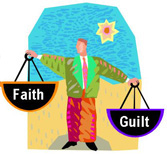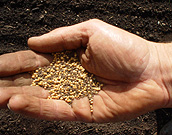
~ Reflection ~ by Deborah Beach Giordano
Prayer and Peace
So far our exploration of prayer has covered trust and faith, courage and honesty, and love and gratitude. We’ve given thought to the importance of finding time for God, and about the need to quiet the noise in our minds so we can hear the Beloved’s response to our prayers.
But what about quieting the “noise” in our hearts? What of the troubles and concerns that disturb our sleep and stalk our waking hours? What of the problems that simply won’t go away?
Problems, Problems, Everywhere
As members of God’s family across the earth, we are painfully aware of the conflicts in the Mideast, the genocide and famine in Darfur, the oppression in China, the lack of comprehensive health care in the U.S., the violence in our cities, the overcrowding in our schools....
 Our hearts go out to to those who have been laid off from their jobs, to the sick, the hungry, to those holding vigils at the bedsides of loved ones... We worry about the mother of the anorexic daughter, the grieving widower, the spouse whose partner has been sent to Iraq, the grandson whose beloved Gramps is dying...
Our hearts go out to to those who have been laid off from their jobs, to the sick, the hungry, to those holding vigils at the bedsides of loved ones... We worry about the mother of the anorexic daughter, the grieving widower, the spouse whose partner has been sent to Iraq, the grandson whose beloved Gramps is dying...
And what of those seemingly insoluble problems that have invaded our own lives? What if the young woman is our daughter? if the homeless man is our brother? if the one who is dying is our grandfather?
Is it possible to find any kind of peace — when there are so many things we can’t do anything about?
Honesty
 If we blithely tell ourselves, “Everything’s going to be ok,” we are liars. In the immediate moment — and perhaps far into the future — these situations and these lives are not going to be “ok.” The parent of a sick child faces many stressful days and nights yet to come, the addict fights a constant battle against the desire for drugs, the soldier will not be safe while in a combat zone...
If we blithely tell ourselves, “Everything’s going to be ok,” we are liars. In the immediate moment — and perhaps far into the future — these situations and these lives are not going to be “ok.” The parent of a sick child faces many stressful days and nights yet to come, the addict fights a constant battle against the desire for drugs, the soldier will not be safe while in a combat zone...
In the long run — when righteousness and peace kiss and God’s final word is spoken — certainly all will be well. In faith and hope we pray that we may see God’s healing grace restore all that is ailing in the land of the living (Psalm 85, 27).
But in the meantime....
We cannot deny the reality of the challenges we face; we can’t pretend our troubles don’t exist. All of the faith in the world cannot eliminate our sadness when someone is suffering, or the frustration we feel at our helplessness to make things right.
Easier Said than Done
There is, of course, that wonderful phrase, “Let go, and let God.” Who among us hasn’t been advised to do just this, while in the midst of troubles or turmoil? And we, good Christian believers that we are, smile, nod meekly and agree. But on the inside we may be sighing in frustration or snorting in indignation. If we could “let go” of what was troubling us, we certainly would!
But is “letting go” really the right answer? The Lord tells his disciples to “persist in prayer,” with as much energy as a widow seeking justice, an anxious host, or a hungry child.
Besides, no matter how zealously we try to hand a problem over to God, it will creep back into our minds. We make matters worse by proclaiming a peace we have not experienced; declaring that we have “given it to God,” and that it troubles us no more. Our struggles are thereby doubled: not only does the initial concern still weigh upon our hearts — but now we must deal with our guilt at having “insufficient faith.”
Responsibility
Which brings me to another of my favorite gospel quotes: “Lord, I believe; help my unbelief!” (Mk 9:24) This man’s prayer was answered with a miracle — even though, by his own admission, he wasn’t a paragon of faith. He had his doubts, and yet his child was healed.
 It’s hard for us to grasp this notion, as most of us have been raised on a diet of mustard seeds. You know what I’m talking about: Jesus admonition that if only we have “as much faith as a mustard seed” we can move mountains. Even allowing for our doubts and our hesitations we figure we’ve got that much faith — at least a grain or so (Mt 17:20; Lk 17:6).
It’s hard for us to grasp this notion, as most of us have been raised on a diet of mustard seeds. You know what I’m talking about: Jesus admonition that if only we have “as much faith as a mustard seed” we can move mountains. Even allowing for our doubts and our hesitations we figure we’ve got that much faith — at least a grain or so (Mt 17:20; Lk 17:6).
Taking the Lord’s teaching to its logical (?) conclusion, we start to worry: is it my fault that my friend is still so ill? Am I not praying hard enough or often enough? Is that why my uncle hasn’t found a new job and my neighbor’s cat is still missing?
If only my faith were stronger, would there be peace in the Middle East, a cure for cancer; would the blind see, the deaf hear and the lame leap for joy?
You get the idea.
By taking our worries — and, perhaps, our egos! — to their logical conclusion, we see how absurd they can be.

Our responsibility is only to pray; to ask for God’s compassionate mercy and life-giving power. We are not in charge of making sure that our prayers are answered the way we want. We aren’t in charge of solving every problem, healing every hurt or fixing every pothole.
It isn’t up to us to decide how things work out. We aren’t in charge of the Universe. That job has already been filled, praise the Lord!
Letting Go
There is a place in our prayer life for the concept of “let go and let God,” — not as an expression of futility, but of faith-borne hope. It doesn’t mean we have resigned ourselves to whatever may come: it isn’t another way of saying que sera, sera, it is an admission that we are not in charge.
When we “let go and let God,” we let go of our belief (or worry, or conceit) that what goes on in the world is dependent on us. That simple confession frees us from the burden of responsibility and guilt that we take upon ourselves.
No longer constrained by fears that we aren’t praying long enough, or often enough, or that we’re not using the right words — we can simply open our hearts to God. With humility and compassion we can tell the One Who Loves Us all that we feel, all that we fear, all that we yearn for.
Letting God
The most difficult, most frightening, seemingly insoluble problems are overcome by prayer. This does not mean that even the most faith-filled prayer will bring about an ideal resolution of our troubles — the world will not be redesigned to our specifications. Instead, we will be renewed and refined.
 “Letting go and letting God” is not an act of surrender, but a pledge of allegiance with our Lord: accepting our vulnerability, opening our hearts, and meeting the world as it is (and not as we wish it was). This is the Way that Jesus led and which we have been called to follow: living lives of courage, hope, and lovingkindness.
“Letting go and letting God” is not an act of surrender, but a pledge of allegiance with our Lord: accepting our vulnerability, opening our hearts, and meeting the world as it is (and not as we wish it was). This is the Way that Jesus led and which we have been called to follow: living lives of courage, hope, and lovingkindness.
Virtual hugs and real-time blessings,
Deborah +
A Spiritual Exercise
Spend some prayer time with these words:
God grant me the serenity
to accept the things I cannot change;
courage to change the things I can;
and wisdom to know the difference.
Living one day at a time;
Enjoying one moment at a time;
Accepting hardships as the pathway to peace;
Taking, as He did, this sinful world as it is,
not as I would have it;
Trusting that He will make all things right
if I surrender to His Will;
That I may be reasonably happy in this life,
and supremely happy with Him
forever in the next.
Amen.
~ by Reinhold Niebuhr